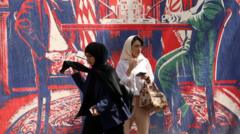The IAEA's confidential report indicates Iran has enriched over 400kg of uranium to 60% purity, heightening fears of nuclear weapon potential amid ongoing negotiations.
**Iran's Uranium Enrichment Surge Sparks Global Concerns, Warns IAEA**

**Iran's Uranium Enrichment Surge Sparks Global Concerns, Warns IAEA**
The International Atomic Energy Agency raises alarms over Iran's growing stockpile of highly enriched uranium, now near weapons-grade levels.
The International Atomic Energy Agency (IAEA) has expressed serious concerns over Iran's recent increase in uranium enrichment, as detailed in a confidential report seen by the BBC. The latest findings reveal that Iran's stockpile of uranium enriched to 60% purity has surpassed 400 kilograms, marking a significant 50% increase over the past three months. This level of enrichment is well beyond what is typically required for civilian nuclear energy and approaches weapons-grade standards, suggesting the potential for Iran to develop nuclear weapons if the material is further refined.
IAEA Director General Rafael Grossi emphasized the implications of Iran's production rates, indicating that the country has been generating highly enriched uranium at a pace that could yield approximately one nuclear weapon per month. The situation has prompted urgency among the U.S., Britain, France, and Germany, who may seek to hold Iran accountable for potential violations of its non-proliferation commitments to the IAEA.
In response to the report, Israeli officials condemned Iran's actions, suggesting a clear intent to pursue nuclear armament without any justification for peaceful use. Prime Minister Benjamin Netanyahu's office released a statement highlighting the alarming level of enrichment and its implications for regional security. Conversely, Iranian Foreign Minister Abbas Araghchi maintained that Iran's nuclear program is intended solely for peaceful purposes, categorically rejecting the pursuit of nuclear weapons.
Despite the escalating tensions and ongoing negotiations between Tehran and Washington for a new nuclear agreement, the IAEA report disclosed no evidence that Iran has curbed its enrichment activities. The assessment also uncovered past undeclared nuclear work conducted by Iran at several undisclosed sites. The negotiations, which have shown some promise since they commenced in April, remain stuck on critical issues such as Iran's right to continue its uranium enrichment under any future accord.
The situation is further complicated by recent comments from senior advisers to Iran's Supreme Leader, suggesting that the nation might reconsider its opposition to acquiring nuclear weapons should international pressures mount. This rhetoric has heightened worries among Western diplomats, who are concerned that Iran could transition into a nuclear threshold state.
The IAEA's board of governors is expected to convene soon to deliberate a course of action, with increasing pressure for Iran to comply with inspections and adhere to nuclear non-proliferation standards. Observers anticipate that discussions may lead to Iran's referral to the UN Security Council, but such a move could take time following the upcoming IAEA meeting.
IAEA Director General Rafael Grossi emphasized the implications of Iran's production rates, indicating that the country has been generating highly enriched uranium at a pace that could yield approximately one nuclear weapon per month. The situation has prompted urgency among the U.S., Britain, France, and Germany, who may seek to hold Iran accountable for potential violations of its non-proliferation commitments to the IAEA.
In response to the report, Israeli officials condemned Iran's actions, suggesting a clear intent to pursue nuclear armament without any justification for peaceful use. Prime Minister Benjamin Netanyahu's office released a statement highlighting the alarming level of enrichment and its implications for regional security. Conversely, Iranian Foreign Minister Abbas Araghchi maintained that Iran's nuclear program is intended solely for peaceful purposes, categorically rejecting the pursuit of nuclear weapons.
Despite the escalating tensions and ongoing negotiations between Tehran and Washington for a new nuclear agreement, the IAEA report disclosed no evidence that Iran has curbed its enrichment activities. The assessment also uncovered past undeclared nuclear work conducted by Iran at several undisclosed sites. The negotiations, which have shown some promise since they commenced in April, remain stuck on critical issues such as Iran's right to continue its uranium enrichment under any future accord.
The situation is further complicated by recent comments from senior advisers to Iran's Supreme Leader, suggesting that the nation might reconsider its opposition to acquiring nuclear weapons should international pressures mount. This rhetoric has heightened worries among Western diplomats, who are concerned that Iran could transition into a nuclear threshold state.
The IAEA's board of governors is expected to convene soon to deliberate a course of action, with increasing pressure for Iran to comply with inspections and adhere to nuclear non-proliferation standards. Observers anticipate that discussions may lead to Iran's referral to the UN Security Council, but such a move could take time following the upcoming IAEA meeting.





















